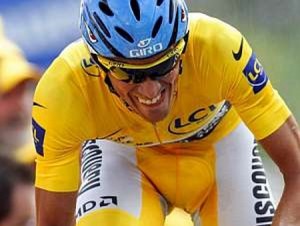Alberto Contador, taking his place at the start line of the Volta ao Algarve last week after the Spanish cycling federation had overturned a proposed one-year ban for doping, described his mere presence at the race as “a real victory.”
The Spanish cyclist’s last competitive victory had come at the 2010 Tour de France, where riding with the Astana team Contador won the race for a third time. In August, a month after the Tour ended, it was announced that Contador had tested positive for a banned steroid, clenbuterol, during the race. He was placed under provisional suspension by the International Cycling Union, leading to a six-month period of claim, counter-claim and profound shock that a man often associated with fair play and clean sport had fallen foul of the anti-doping crusade.

Moreover, Astana itself was seen as a leading light in the fight against doping in a sport with a more than chequered past. An in-house anti-doping system was set up, with Contador’s backing, by Copenhagen University-based doctor Rasmus Damsgaard. “We will strive to compete in a safe, healthy and sporting way,” Damsgaard said at the time. Given those circumstances, if Contador had been doping, the damage to the sport would be particularly heavy.
Contador maintains that he ingested the banned substance via a tainted steak imported from Irún by José Luis López Cerrón, the director of the Vuelta a Castilla y León race, and a friend of Contador. It sounded like a far-fetched tale. Unsurprisingly, the World-Anti Doping Authority (WADA) and the ICU did not swallow it and placed Contador under a provisional ban. However, once the case was passed back to the Spanish federation to decide on a sanction, it ruled first for a compromise in the form of a one-year ban, then to exonerate the rider on the grounds he had taken the substance unwittingly.
It will probably never be known whether or not Contador knowingly cheated, but the shadow of the case will follow him to the finish line of his career.
Pedro Manonelles Marqueta, secretary general of the Spanish Federation of Medicine in Sport, said Contador’s story is “possible, but not very probable.”
Damsgaard, a former director of anti-doping at Contador’ current team, Saxo Bank, was also unmoved by Contador’s version of events. “If the dates are correct, it’s more likely that he did a ‘Landis’ – in other words, he received a[n illegal] transfusion of his own blood, extracted months earlier, when he was using clenbuterol that his body then received again.”
Contador’s defence was forthright: “The ICU knows perfectly well what happened and that it is a different matter as it is a clear case of contamination, not comparable with other cases involving clenbuterol. As I was leading the race I took many doping tests and this works in my favour. The day after the quantity was much smaller and the following day it did not register at all. It’s an amount so small that it is impossible to administer except via dietary contamination and in terms of performance it does no good at all, which any expert can confirm.”
WADA representatives visited the butcher’s shop in Irún and confirmed that they could find no trace of clenbuterol therein. The body also handed the Spanish Cycling Union a 2008 EU report into clenbuterol use for illegally fattening livestock. Of 300,000 samples tested in the study, just one showed a possible trace of the substance.
Meanwhile, the ICU’s president, Pat McQuaid, has apparently confirmed that there is something of a campaign against Spain in anti-doping circles. Having said that he would be happy should Contador not race again, the ICU chief last week launched a tirade against support received by Contador by, among others, Prime Minister José Luis Rodríguez Zapatero and opposition leader Mariano Rajoy. McQuaid has also accused Spain of being soft on doping – “I don’t know what the percentage is but a large percentage of our doping cases come from Spain and so far there doesn’t seem to be the will to tackle that in Spain, and that will needs to come from the government down.”
Strangely, McQuaid used the announcement of Lance Armstrong’s retirement this week to praise the American seven-time Tour winner – “the sport of cycling has a lot to be thankful for because of Lance Armstrong” – on the same day it was announced that the UCI was considering legal action against 2005 Tour winner Floyd Landis. Landis, who has repeatedly claimed Armstrong used banned substances, charged that the UCI “may protect certain cyclists suspected of doping and not others, may falsify results and create stars,” on German television. McQuaid made no reference to ongoing investigations into Armstrong during his eulogy for the Texan.
In any case, Contador is free to ride again after the RFEC overturned his provisional suspension and his Saxo Bank team hopes to have him in place for this year’s Tour.
The ICU, though, has yet to study the RFEC’s report and when it lands on McQuaid’s desk, the sport’s most powerful figure will have until mid-March to appeal against the decision.
For Contador the case is far from over. In the meantime, he has sworn not to touch meat again during competition.
Leave a Reply
You must be logged in to post a comment.